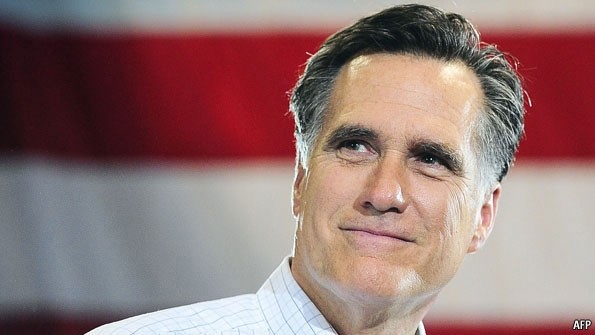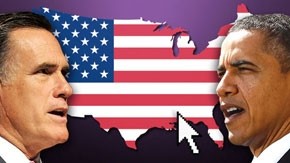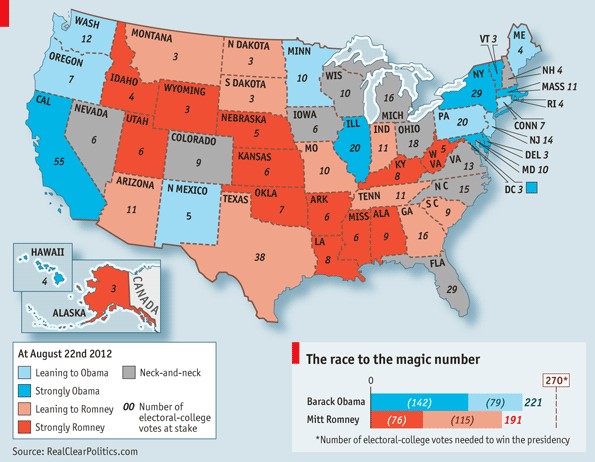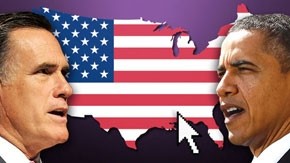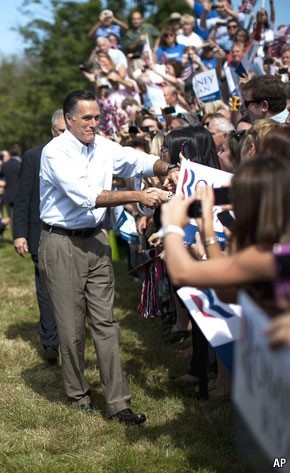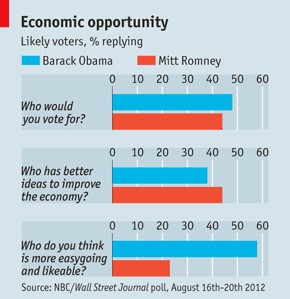

 字體:小 中 大
字體:小 中 大 |
|
|
|
| 2018/07/27 15:39:24瀏覽52|回應0|推薦0 | |
The presidencySo, Mitt, what do you really believe?Too much about the Republican candidate for the presidency is far too mysteriousAug 25th 2012 | from the print edition
WHEN Mitt Romney was governor of liberal Massachusetts, he supported abortion, gun control, tackling climate change and a requirement that everyone should buy health insurance, backed up with generous subsidies for those who could not afford it. Now, as he prepares to fly to Tampa to accept the Republican Party’s nomination for president on August 30th, he opposes all those things. A year ago he favoured keeping income taxes at their current levels; now he wants to slash them for everybody, with the rate falling from 35% to 28% for the richest Americans. All politicians flip-flop from time to time; but Mr Romney could win an Olympic medal in it (see article). And that is a pity, because this newspaper finds much to like in the history of this uncharismatic but dogged man, from his obvious business acumen to the way he worked across the political aisle as governor to get health reform passed and the state budget deficit down. We share many of his views about the excessive growth of regulation and of the state in general in America, and the effect that this has on investment, productivity and growth. After four years of soaring oratory and intermittent reforms, why not bring in a more businesslike figure who might start fixing the problems with America’s finances? In this section · »So, Mitt, what do you really believe? · Barren rocks, barren nationalism Related topics · Abortion Details, details But competence is worthless without direction and, frankly, character. Would that Candidate Romney had indeed presented himself as a solid chief executive who got things done. Instead he has appeared as a fawning PR man, apparently willing to do or say just about anything to get elected. In some areas, notably social policy and foreign affairs, the result is that he is now committed to needlessly extreme or dangerous courses that he may not actually believe in but will find hard to drop; in others, especially to do with the economy, the lack of details means that some attractive-sounding headline policies prove meaningless (and possibly dangerous) on closer inspection. Behind all this sits the worrying idea of a man who does not really know his own mind. America won’t vote for that man; nor would this newspaper. The convention offers Mr Romney his best chance to say what he really believes. There are some areas where Mr Romney has shuffled to the right unnecessarily. In America’s culture wars he has followed the Republican trend of adopting ever more socially conservative positions. He says he will appoint anti-abortion justices to the Supreme Court and back the existing federal Defence of Marriage Act (DOMA). This goes down well with southern evangelicals, less so with independent voters: witness the furore over one (rapidly disowned) Republican’s ludicrous remarks about abortion and “legitimate rape” (see article). But the powers of the federal government are limited in this area; DOMA has not stopped a few states introducing gay marriage and many more recognising gay civil partnerships. The damage done to a Romney presidency by his courting of the isolationist right in the primaries could prove more substantial. He has threatened to label China as a currency manipulator on the first day of his presidency. Even if it is unclear what would follow from that, risking a trade war with one of America’s largest trading partners when the recovery is so sickly seems especially mindless. Some of his anti-immigration policies won’t help, either. And his attempts to lure American Jews with near-racist talk about Arabs and belligerence against Iran could ill serve the interests of his country (and, for that matter, Israel’s).
Once again, it may be argued that this will not matter: previous presidents pandered to interest groups and embraced realpolitik in office. Besides, this election will be fought on the economy. This is where Manager Romney should be at his strongest. But he has yet to convince: sometimes, again, being needlessly extremist, more often evasive and vague. In theory, Mr Romney has a detailed 59-point economic plan. In practice, it ignores virtually all the difficult or interesting questions (indeed, “The Romney Programme for Economic Recovery, Growth and Jobs” is like “Fifty Shades of Grey” without the sex). Mr Romney began by saying that he wanted to bring down the deficit; now he stresses lower tax rates. Both are admirable aims, but they could well be contradictory: so which is his primary objective? His running-mate, Paul Ryan, thinks the Republicans can lower tax rates without losing tax revenues, by closing loopholes. Again, a simpler tax system is a good idea, but no politician has yet dared to tackle the main exemptions. Unless Mr Romney specifies which boondoggles to axe, this looks meaningless and risky. On the spending side, Mr Romney is promising both to slim Leviathan and to boost defence spending dramatically. So what is he going to cut? How is he going to trim the huge entitlement programmes? Which bits of Mr Ryan’s scheme does he agree with? It is a little odd that the number two has a plan and his boss doesn’t. And it is all very well promising to repeal Barack Obama’s health-care plan and the equally gargantuan Dodd-Frank act on financial regulation, but what exactly will Mr Romney replace themwith—unless, of course, he thinks Wall Street was well-regulated before Lehman went bust? Playing dumb is not an option Mr Romney may calculate that it is best to keep quiet: the faltering economy will drive voters towards him. It is more likely, however, that his evasiveness will erode his main competitive advantage. A businessman without a credible plan to fix a problem stops being a credible businessman. So does a businessman who tells you one thing at breakfast and the opposite at supper. Indeed, all this underlines the main doubt: nobody knows who this strange man really is. It is half a decade since he ran something. Why won’t he talk about his business career openly? Why has he been so reluctant to disclose his tax returns? How can a leader change tack so often? Where does he really want to take the world’s most powerful country? It is not too late for Mr Romney to show America’s voters that he is a man who can lead his party rather than be led by it. But he has a lot of questions to answer in Tampa. from the print edition | Leaders 筆者對於美國2012總統大選的首篇看法,貼在上篇之討論區即為經濟學者報導原文章,而同期的Briefing算是說經濟學者雜誌原本很期待Mitt Romney的勝選而作的專題報導 Mitt Romney’s chancesThe changing manHe has many factors in his favour. But to win the presidency Mitt Romney will have to reinvent himself once again—this time as a likeable, sympathetic guyAug 25th 2012 | from the print edition
GEORGE ROMNEY, father of the present Republican presidential nominee and himself a candidate for the White House in 1968, used to joke that his campaign had been “like a miniskirt: short and revealing”. By analogy, his son Mitt’s bid for the presidency has been more of a crinoline: long and cumbersome. The younger Mr Romney has been running for president for six years at least, since the waning days of his governorship of Massachusetts. He has proved doubters wrong by progressing as far as he has, in spite of his flip-flopping, his woodenness, his wealth and his Mormon faith. Yet he has not made it look easy, and is currently behind in the polls in an election that many pundits think is the Republicans’ to lose. Mr Romney, who will officially be anointed the Republican nominee at the party’s convention in Tampa on August 30th, is still very much in contention—but more by virtue of doggedness than flair. Related topics Mr Romney has run for public office three times before. He won one of those races (for governor, in 2002) and lost the other two (for the Senate in 1994, and for president in 2008). He came third in the Republican presidential primaries last time round, measured by number of delegates won, or second, if you go by his share of the vote. He conceded to John McCain just over a month into the race. This year, thanks in part to a more attenuated primary calendar, it took much longer to settle the nomination. A number of fancied candidates, including Jeb Bush, Chris Christie and Mitch Daniels (all successful current or former governors) failed to enter the race, leaving Mr Romney the favourite in a lacklustre field. Yet it was not until April that he finally dispatched Rick Santorum, a militantly conservative former senator from Pennsylvania who lost his re-election bid in 2006 by 18 points, and Newt Gingrich, a mercurial former Speaker of the House of Representatives who had “more baggage than the airlines”, as a pro-Romney ad memorably put it. Chameleon-in-chief? Mr Romney struggled in particular with the conservative base, who had misgivings about his inconsistent record. (His Mormonism, which is considered heretical by many evangelical Christians, may also have put off some religious voters.) Right-wing pundits dwelt on the fact that he had run for the Senate, and for governor of Massachusetts, promising not to limit access to abortion—but now claimed to be vehemently pro-life. By the same token, he had supported a regional cap-and-trade scheme to trim greenhouse-gas emissions in Massachusetts before renouncing it late in his governorship. He now says that the causes and extent of global warming are too uncertain to merit expensive efforts to fight it, especially in such grim economic times. Above all, he stoked suspicions on the right by championing health-care reforms in Massachusetts that served as the template for Barack Obama’s health-care law, before denouncing Obamacare as an affront to liberty that must be repealed. In the end Mr Romney prevailed partly by adopting a series of positions designed to please right-wing primary voters. He unexpectedly unveiled a proposal for a whopping tax cut that the 59-point economic plan he released last year had mysteriously failed to mention. He also developed a fervent opposition to anything that smacked of compassion towards illegal immigrants, chastising both Mr Gingrich and Rick Perry, the governor of Texas, for their supposed lapses in that regard during debates among the Republican candidates. Mr Romney and his supporters also vastly outspent his rivals, blitzing them with vicious advertisements. Since clinching the nomination, Mr Romney has moved back towards the centre in some respects. He has spent most of his time and advertising budget talking about the economy, rather than the more polarising social issues that often arose in the primaries. He has released a new immigration policy which makes no mention of his call for those present illegally to “self-deport”, but embraces some more cuddly-sounding goals such as reuniting families and making it easier for foreigners to take up seasonal jobs. He has also pledged to rescind the $716 billion in savings that Mr Obama’s health-care reforms aim to garner from Medicare over the next decade, presumably to curry favour with older voters. Mr Romney’s advisers, a peculiar mix of zealots and moderates, provide little hint as to where his own instincts really lie. On immigration policy he has sought the advice of Kris Kobach, secretary of state of Kansas, and the guiding force behind controversial laws in Alabama and Arizona cracking down on illegal immigrants. On foreign policy he has consulted lots of bellicose neocons from the Bush administration, notably John Bolton, as well as a few more measured voices, such as Robert Zoellick. Two mainstream academics and former advisers to Mr Bush, Greg Mankiw and Glenn Hubbard, have the most prominent roles on the economic team. The campaign has unveiled endless “advisory groups” on different topics—with more members than Mr Romney could possibly consult in a lifetime, let alone during a presidential campaign. It is hard to know whose counsel Mr Romney really values beyond that of his wife, a few former colleagues from his days as a private-equity investor, and senior campaign staff, many of whom are holdovers from his previous presidential run. Ed Gillespie, a former chairman of the Republican National Committee and co-founder of the Crossroads groups, which plan to spend hundreds of millions of dollars this year boosting Republican candidates (see Lexington), is also playing a role. By picking Paul Ryan as his running mate this month, Mr Romney has further muddied the ideological waters. Mr Ryan, after all, is best known for his efforts to cut spending on entitlement programmes such as Medicare—something Mr Romney is now attacking Mr Obama for. His selection is widely seen as an effort to enthuse the Republican base, which likes his government-shrinking budget proposals. Democrats spy an opening: they are drooling at the chance to link Mr Romney with Mr Ryan’s ruthless proposed cuts to things like food stamps and student loans. The scene is set for a close and bitter fight. The latest polls show Mr Romney trailing Mr Obama by 1.5%, according to RealClearPolitics, a website which calculates a rolling average. That is well within the typical margin of error. Although the odd poll puts Mr Romney in the lead, Mr Obama has maintained a narrow but consistent advantage in RealClearPolitics’ standings of 0.2-5.3% since Mr Romney clinched the nomination in April.
The presidency is not decided by a national vote, of course, but by state-by-state competitions for delegates in the electoral college. By that measure, too, Mr Obama seems to be in the lead—but not insuperably so. RealClearPolitics, this time using rolling averages of local polls, sees states with 221 of the 270 electoral-college votes needed to win leaning towards Mr Obama, compared with just 191 in Mr Romney’s column (see map). But that still leaves ten states worth 126 votes as toss-ups—more than enough to put Mr Romney over the top should the race swing his way between now and election day. Summer polls, it should be said, are not a very reliable portent of how things will turn out in November. Moreover, the numbers are likely to bounce around over the next few weeks, thanks to the fleeting effects first of Mr Romney’s choice of Mr Ryan as his running mate, then of the Republican convention and finally of the Democratic one, which takes place in Charlotte, North Carolina during the first week of September. Let battle commence Mr Romney will certainly have plenty of money to burnish his image over the next two months. The long Republican primary had put him at a financial disadvantage, both by forcing him to spend money and by impeding him from raising it, even as Mr Obama stuffed his war chest. But for the past three months Mr Romney has outdone his rival in fund-raising. He and various closely allied branches of the Republican Party brought in a total of $207m in June and July—$60m more than the president. His support groups now have more cash on hand than their Democratic equivalents: $186m to $124m. The Romney campaign talks about raising $800m in all. The Obama campaign is aiming for $750m. It is a far cry from 2008, when Mr Obama spent twice what John McCain did.
The reversal is all the starker when you consider the notionally independent “outside groups” backing or attacking the candidates. The Republican ones have vastly outspent their Democratic counterparts so far, and seem likely to continue to do so. Mr Obama has been the victim of some $70m in attack ads from such outfits; Mr Romney has suffered only $30m-worth, mostly during the primaries. Republicans are also cheered by Mr Obama’s “burn rate”: he is spending more than he is taking in. In July his expenses, of $59m, exceeded his income by $10m. The Obama campaign says the money is being well spent, on an early advertising binge aimed at denting Mr Romney’s reputation and on the development of a huge network of field offices. The campaign spent $3m on wages in July to Mr Romney’s $1.7m. In North Carolina, a state that Mr Obama won in 2008 but where Mr Romney is now favoured, the Obama campaign has 47 outposts to Mr Romney’s 19. All this is intended to allow the Democrats to drum up and turn out supporters in huge numbers, as Mr Obama did last time. But the Romney campaign scoffs at its rivals’ talk of an election-winning “ground game”. They say the Democrats are wasting money on far too many field offices. What can all those Obama staffers in North Carolina possibly be doing, one Romney strategist asks. Anyway, efforts to mobilise Mr Obama’s supporters from 2008, using local volunteers, e-mail and social media rather than just television ads and mailings, will be counterproductive if voters have soured on the president. Republicans have defied expectations by quickly rallying around Mr Romney, his campaign notes, whereas Democrats seem down in the dumps. In the latest Economist/You Gov poll, only 35% of Democrats said they were very enthusiastic about voting, compared with 50% of Republicans. Women, young people and minorities, the bedrock of Mr Obama’s electoral coalition, are notably lukewarm. Last time a presidential election hinged on turnout, in 2004, it was the Republicans who managed to muster more of their troops.
New data on voter registration bear out the Romney camp’s optimism. A recent study by the Third Way, a centrist Democratic think-tank, found that the number of registered Democrats in eight swing states had actually declined by over 800,000 since 2008, despite the gradual cranking up of the Obama turnout operation over the past year. (Republican registrations have also fallen, but by less than 80,000.) That is all the more remarkable because minorities’ share of the electorate is growing, whereas that of the white working class, a Republican mainstay, is shrinking. Moreover, a series of new restrictions imposed, for the most part, by Republicans in state legislatures may also reduce Democratic turnout, if upheld by the courts. Florida and Ohio have cut back on early voting. Several more swing states, including Pennsylvania and Wisconsin, plan to start requiring voters to show certain forms of identification. Others have made it harder for potential voters to register. These changes will affect over 5m people, according to the Brennan Centre for Justice at New York University. It says minorities, the young and the poor—all Democratic-leaning groups—will be disproportionately affected. In Pennsylvania the leader of the Republican majority in the state House of Representatives declared that the new voter-identification law “is going to allow Governor Romney to win the state”. Mr Romney’s admen also believe they will have an easier time propagating their message, centred as it is on the economy. Mr Obama, who would rather talk about almost anything else, has to craft different pitches for different slices of the electorate: to the young he highlights how he has kept interest-rates low on government-backed student loans; to Hispanics, he trumpets a recent executive order making life easier for illegal immigrants. Mr Romney, by contrast, can simply harp on about high unemployment which, as it happens, has hit young people, Hispanics and (by some measures) women especially hard. The electoral map reflects the Republicans’ improving fortunes. Talk of the president winning Arizona, which he lost last time, has faded. Indiana, which he won in 2008, now seems firmly in Mr Romney’s camp. RealClearPolitics rates as toss-ups states that the Democrats have won for decades, such as Michigan and Wisconsin. Analysts often describe presidential elections involving an incumbent as a two-stage process. First, voters must decide whether the sitting president has done a good enough job to merit re-election. Only if they have qualms on that score do they begin to size up the challenger. Usually, an overall approval rating close to or above 50% signals victory for the incumbent; anything less creates an opening for his rival. Mr Obama sits right on the cusp: his approval rating is in the upper 40s, near the level at which Mr Bush prevailed in 2004 and Gerald Ford foundered in 1976. Polling suggests that on the issue voters consider most important, the economy, they have soured on Mr Obama. A recent NBC/Wall Street Journalpoll, which showed Mr Obama four points ahead of Mr Romney, nonetheless found that voters had more faith in Mr Romney when it came to improving the economy, by a margin of six points (see chart). Similarly, voters rate Mr Obama’s handling of the economy nine points lower than they do his overall performance, according to the Economist/YouGov poll. That gives Mr Romney an opening, and explains why his campaign dwells endlessly on the miserable state of the economy. Todd Akin, the Republican Senate nominee for Missouri whose idiotic remarks on rape caused such a furore this week (see article), is thus an unwelcome distraction. Passing the “ordinary guy” test The big problem is that voters do not seem to like Mr Romney very much. Only 38% of respondents in the Economist/YouGov poll professed a favourable opinion of him, compared with 44% for Mr Obama. Only 39% said they liked Mr Romney as a person, irrespective of his political views, compared with 57% for Mr Obama. Just 34% thought he cared about people like them, compared with 48% for Mr Obama. More than half of those planning to vote for Mr Romney say they are not endorsing him so much as rejecting Mr Obama.
Arguments about Mr Romney’s tax affairs and record in business refuse to go away. At a recent focus group in Wisconsin, a swing state, wavering female voters described him as a cold, distant and snooty figure with whom they would be uncomfortable socialising. They saw Mr Obama, by contrast, as a normal family man: one woman imagined him making pancakes for his children on a Saturday morning. Although he is now a veteran of the hustings, Mr Romney can still sound distinctly wonkish, even awkward, when addressing supporters. At a rally on August 2nd at the Jefferson County fairgrounds outside Denver, he waved a printed report card measuring Mr Obama’s record against a string of 2008 campaign pledges. The president, he maintained, had earned “little red arrows” for failing to fulfil his promises. If elected, Mr Romney solemnly promised, his own report card would be filled with green ones. Despite all the factors in Mr Romney’s favour, in short, he will struggle to win the election unless he does a better job of selling himself personally. There are signs that he is beginning to try. His campaign finally began running gauzy biographical advertisements during the Olympics, after loud complaints from Republican strategists that it was leaving it to the Obama campaign to introduce Mr Romney to voters. Having avoided any talk of his religion for months, Mr Romney invited reporters to attend church with him in mid-August. Expect much more of that sort of thing at the convention: talk of Mr Romney’s piety; his devotion to his wife and family; his kindness to strangers. The most fungible of candidates will attempt to reinvent himself once again, as a likeable guy. Whether voters will find his latest incarnation any more consistent or credible than the previous ones remains to be seen. from the print edition | Briefing · Recommended · 70 So, Mitt, what do you really believe? Aug 30th 2012, 15:23
On Tuesday, Mitt Romney - who owns the highest degree of education and the identity of the richest candidate in American history - has been officially nominated at Republican national convention in Tampa, Florida. The Republican supporter share their passion with little effect of tropical storm Isaac. The recent week’s poll shows that Republican nearly evens the number of ratio in 1% narrow. Obviously, Republican whole strategy emerge while Paul Ryan, House of Representatives member, is sure to be nominated as Mitt’s running mate rather than also-probable Condoleezza Rice, the former Secretary of State.
Having experienced several presidential election similar to American in Taiwan (let me transiently cross out the factor of cross-Taiwan Strait fallacy), I guess that Mitt can be elected as the presidency several months later. Mitt is inclined to make clearer of social welfare issue and have clearer attitude toward the adjustment of poor-wealth tax reform, instead of the incumbent Barack Obama criticized for possibly defying constitution owing to the healthcare reform and for the high unemployment rate.
As a whole, Barack Obama successfully has himself symbolized as an international moderator, such as the two-state solution to Iserel-Palestain - leading him to 2009’s Nobel Peace laureate with Benjamin Netanyahu. Obama accumulates many experience of visit to foreign nation for miles. But, as almost of presidential election’s custom, the key to White House depends on the expression of national issue - like economic vision, the social welfare - and some part of the relation between candidate himself and people in the nation. Seemingly, Obama doesn’t keep the above good enough to ensure high approval rate.
By contrast, Mitt, 65, worked as a prominent governor for some time. His political grade is not bad as his outstanding Harvard degree. He has better image in front of the massive American with his wife, Ann Romney. Although he lacks of some decoration like Obama’s rhetoric speech and the movie “By the people, For the people”, Mitt still steadily exercise the circle of public opinion, political release plus feedback. He know the real poor-rich discrepancy better than Obama from the whole structure concerned, the important part of macroeconomics.
By the way, the relation with China is also a point to see American future. In recent years, the “Beijing consensus” - put forward by Joshua Ramo and Stefan Halper - gradually overtakes “Washington consensus” when it comes to the aid of African nation. Like Chad’s case by Zhou Yong-kang, a powerful officer who annihilated Bo Xi-lai in truth (his action funnily helped me), Beijing rises the effect around the world because the more “decent” etiquette practices between China (than America) and the rest of the world. In fact, the “post-American period” appears with some question as Fareed Rafiq Zakaria described several years ago. A new construction or a libra may be established between Washington D.C. and Beijing with Japan’s Tokyo.
Well, if Romney is elected, the unambiguous bridge between this two capital is considered to be a period’s debut of a visionary image. Moreover, although China needs high quantity and better quality of export, as China’s prime minister Wen Jia-bao said last week, the probable yuan’s appreciation is indeed an issue to have both nation feel more friendly to each other. But China has to ensure her own’s high economic growth. The reasonable chance to let yuan go appropriate 10-15% appreciation is when per capita of GDP surpasses USD. 10000 with China’s interest rates lower than 2.5%. Another attention is about China’s national capitalism (market economy), which recently turn out to incline free economy, so government’s intervention wanes. The situation is changing faster with uncertainty increasing. But I think that Mitt can do well than Obama.
I still remember Taiwan’s democratic charisma of Chen Shui-bian and Lu Show-lian (Anne Lu) in wonder while talking about this time’s US election with Hsiao Bi-khim, who is involved in American congress for a long time. Yeah, I talk to Hsiao about this wonder again, by this US election, feeling pitiful of the misfortune befalling this democratic “Great”. (I don’t know whether Mitt helps this monkey?).Yesterday when I saw Bloomberg’s news about Ann Romney, the image resembles the invinsible couple of Chen, Chen and Wu Shu-jen, a decade ago.
The title is confused but, after I find out a good match, Ricky Martin’s song “Do you really want it?”, I see the Economist’s tricky. So, Mitt - the more probable winner, believes himself beyond question. Not so does the Economist, who believes just tomorrow’s salary and chat. Ah, and I continue to believe the Communism as the ordinary life goes on.
Recommended 5 Report Permalink |
|
| ( 心情隨筆|心情日記 ) |



